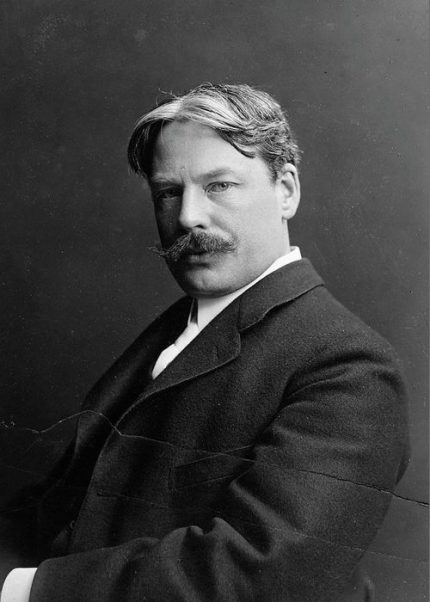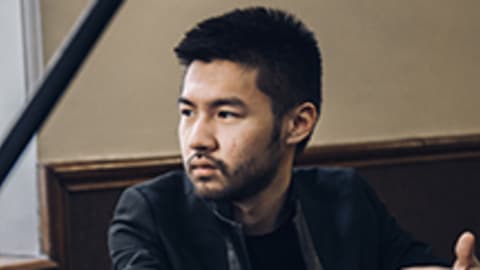Kalmar leads Grant Park Orchestra in exuberant American works
Before there was the American symphony, there was the American tone poem and the American suite.
In the late 19th century, American composers were beginning—slowly, tentatively—to forge a national musical identity. (The iconoclastic Charles Ives was then, as now, an outlier.) Not many homegrown composers were writing symphonies at that point; the preferred form for large-scale orchestral works was the suite or tone poem—less formal structures that allowed composers to experiment with distinctive American elements in a way that didn’t end up sounding like Brahms or Dvořák.
In this period, tone poems on mythic or chivalrous themes were written by people like Horatio Parker (Ives’ teacher), Victor Herbert, Arthur Farwell, Henry Hadley and Arthur Foote. (A pioneering three-disc set, conducted by Karl Krueger and reissued on the Bridge label, offers a superb collection of this largely forgotten music.)
Edward MacDowell (1860-1908) would become the most popular composer of this nascent American school, largely for his songs and picturesque solo piano pieces. Yet MacDowell also wrote in larger forms—his Piano Concerto No. 2 (1890) was a repertory favorite through the first half of the 20th century.
MacDowell’s Suite No. 2 (“Indian”) was performed by the Grant Park Orchestra, led by Carlos Kalmar Wednesday night at the Pritzker Pavilion.
Though MacDowell never wrote a symphony, this 35-minute suite is the largest work he would compose in any form. As suggested by its subtitle, MacDowell is said to have mined Native American musical motives for his melodies throughout the suite’s five movements.
Much was made of this then-unique element at the time of the 1896 premiere. Boston critic Philip Hale averred that the “In War-Time” section surely contained “characteristic features of the Iroquois scalp-dance.” How could anyone know for sure without being dead?
Regardless, the issue of whether the melodies are authentic is less relevant today—or should be—and one can simply listen to MacDowell’s colorful, well-crafted music and enjoy his suite on its own terms.
Back for the final three weeks of the lakefront festival, artistic director Kalmar led a lively and atmospheric performance. The Grant Park players charted the opening “Legend” movement, segueing from brooding depths to a vital Allegro, the strings giving great warmth to the ensuing lyrical theme. A shaky brass moment apart, the players put across the lilting expression of the “Love-Song” and the amiable bustle of the not-too-warlike “In War-Time.”
The “Dirge” section—inspired by the lamenting song of a mourning Kiowa mother— plumbs a surprising depth of emotion, aided by the players’ evocative trumpet and horn solos. Perhaps the concluding “Village Festival” veers a bit close to bumptious “Injun” pastiche but it closes MacDowell’s suite effectively with a grand and sonorous conclusion.
Programming MacDowell’s Second Piano Concerto might have made for an artful all-American program. But no one was likely complaining about Shostakovich’s Piano Concerto No. 2, the evening’s centerpiece, as played by Conrad Tao Wednesday night.
Even though it is a late-ish work—written for the composer’s son Maxim, who gave the premiere—Shostakovich’s Second Concerto is an uncharacteristically sunny, light-hearted piece with snappy themes and much headlong virtuosity.
Tao showed once again that his power and stainless-steel technique are unassailable. The flamboyant soloist delivered ample keyboard bravura in the motoric outer movements (along with excessive arm-waving and head-wagging). While crafted as a showpiece, the wry charm of the work was rather slighted in Tao’s unsubtle style, especially his literal, pounding approach to the first movement’s hectic joie de vivre.
Still, Tao distilled rapt expression in the sweet-sad Andante, one of the composer’s loveliest inspirations. The insistent finale was undeniably exciting in the lightning back-and-forth between soloist and orchestra—led by a beaming Kalmar who clearly has great fatherly affection for his soloist. Tao’s dazzling solo playing in the race to the coda brought the Pritzker Pavilion audience to its feet.
The repeated curtain calls ultimately bore fruit with Tao offering a Bach encore. His poised rendition of the Sonatina from the “Actus Tragicus” cantata (BWV 106) was the pianist’s own reduction of György Kurtág’s four-hand arrangement.
The evening closed with more American music, the Four Dance Episodes from Copland’s celebrated Rodeo.
Once a concert-hall staple, Copland’s Western ballet score has been shot out of the canon in recent decades—perhaps because Rodeo is viewed in some lofty circles as merely a slight and jingoistic medley of cowboy tunes.
That sniffy attitude is not only unfair but blatantly wrong. While Copland is here at his most melodic and populist, Rodeo is also sardonic and witty in its harmonic flips, sudden pauses and musical jokes, managing to be affectionate about the Western tropes while gently sending them up.
While it’s not Copland’s greatest work—I’d go with Appalachian Spring, the Piano Variations or the Third Symphony—Rodeo is undeniably his most “American” and sheerly enjoyable.
Aaron Copland conducted the festival premiere of Rodeo in 1972, and the life-affirming performance by Kalmar and the orchestra Wednesday night was in the same storied tradition.
Kalmar led a high-stepping rendition of huge panache that put across the crackling energy and rhythmic snap of “Buckaroo Holiday.” There were a few rough ensemble moments and the gentle melancholy of “Corral Nocturne” would have likely benefited from a more hushed and inward approach.
Still, “Saturday Night Waltz” etched its Old West milieu nicely with fine contributions by the woodwinds, and the concluding “Hoe-Down” was put across with exhilarating vitality.
The Grant Park Music Festival moves indoors to the Harris Theater this weekend due to Lollapalooza. Carlos Kalmar leads the Grant Park Orchestra in Jennifer Higdon’s blue cathedral, Ole Schmidt’s Hommage a Stravinsky, Mozart’s Symphony No. 38 “Prague,” and Bernstein’s Serenade with violinist Vadim Gluzman as soloist. Concert time is 6:30 p.m. Friday and 7:30 p.m. Saturday. gpmf.org
Posted in Performances




